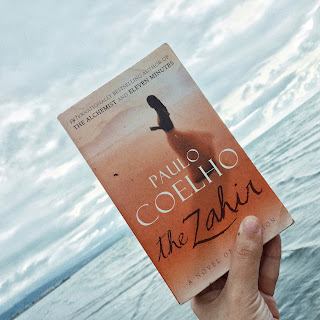THE ZAHIR—- EVERYTHING IN THE BOOK THAT FASCINATED MY CURIOSITY
Have you ever heard of the words “Favor Bank”? This is essentially an invisible bank where you ‘should’ keep track of all the people who has done you great favors which explicitly translates to, I’d like to say,—-You owe them. And then all the individuals who have reached out to you for favors— they owe you. This is pretty equivalent to our modern banking’s withdrawal and deposit. However, it is not entirely necessary to return each favors. It is always based upon one’s discretion and well, guilt and conscience to top that. But it is downright important to know that the ones you have helped are potential instruments should you need any aid in the future. Connection, folks. Connection. (I’d like to stress an emphasis that our perspective of doing favors for people should not stem from an ulterior motive of getting a leverage out of it.) Also, it is plain initiative to lend a hand to the ones who have done you great favor should they also seek your help. So take into account everyone who is in your Favor Bank.
On a remotely succeeding point, railway tracks are always 143.5 cm apart. It is for me amusing more than surprising. For the skeptics, You can keenly measure it in the nearest railway stations near you. Although I highly doubt the security personnel will let you.
Some great artists are known to have been clinically diagnosed with Epilepsy—Van Gogh, Edgar Allan Poe, Lewis Caroll. Epilepsy is known to trigger self-destruction among those who are affected.
Lewis Caroll MIGHT have written Alice in Wonderland to creatively delineate unpleasant experiences during an epileptic fit. The sudden sight of flashing lights. The unwanted vision of peculiar creatures that does not reflect reality are signs associated with epilepsy. Van Gogh’s epileptic fits MIGHT have provoked self-destruction, in which he calls the attacks “the storm within”. And it actually does make a lot of sense when you take into account all his self- destructive behavior and the dangers he mindlessly inflicted on himself. Also, that storm within that he was referring to probably pertains to all the inner chaos he’s perpetually struggling with. I’m not certain as to how epilepsy might have something to do with Poe’s writing of his numerous works.
~
Our endless search for happiness is one that speaks loudly of our constant search to fill spaces of emptiness, of lost love, the lack thereof, and inexplicable sadness in spite of having everything one can possibly have and aspire for. It speaks of our humanity, too. How we are in constant longing of something or someone unknown. And all various complexities that come alongside it. Our confusion and indecisiveness as to what and who we really want. That is why we are humans. And that is also why it’s difficult to achieve a permanent state of happiness. For we humans are always changing, always evolving. Thus, our happiness does not depend solely on one thing, occassion or person. When this happiness gradually fades and no amount of work can bring forth lost happiness, we move on and contemplatively search for every possible prospect that will give us happiness.
It is only with a brush of death, and imminent danger that we more often than not, appreciate our time here on Earth and live our lives better. The soldiers on war who have constant battle scars are living their lives with an essential cause knowing that they might die tomorrow, or even within the day, or in the next few hours, worst, minutes. On the verge of dying, they don’t ask for the paramedics to save the little potential they have, rather, they mindfully leave messages of love to the family they will be leaving behind. And they all die a happy man. I now wondered how reckless we’ll be if our days aren’t numbered.
Last point, why is it that most men only realize that they truly love a woman only after they are out of their lives? Why does it have to reach that extent? Coelho’s third wife, Esther, (his Zahir) went on an expedition in search of happiness, love and energy and aggressively leaving without telling the former her whereabouts. It is then during this period that Coelho realized how much he truly loves his wife. Prior to this, he would engage in extramarital affairs and would just treat his Esther a companion to vent out his frustrations, rather than a faithful wife. But after she left, he gradually realizes how awfully empty his life without her. Everyday for two years, the thoughts of her consumed his mind. Despite having various women for sexual affairs and mere companion, he can’t dismiss Esther off his mind, in his writings, in his life. Why do we always have to wait for that time where everything might be a little too late before we take appropriate actions?
By now, you should know that your past loves should give you two important lessons. One, they should have taught you how to love better. Two, they should have already taught you what you truly, utterly deserved.



Comments
Post a Comment